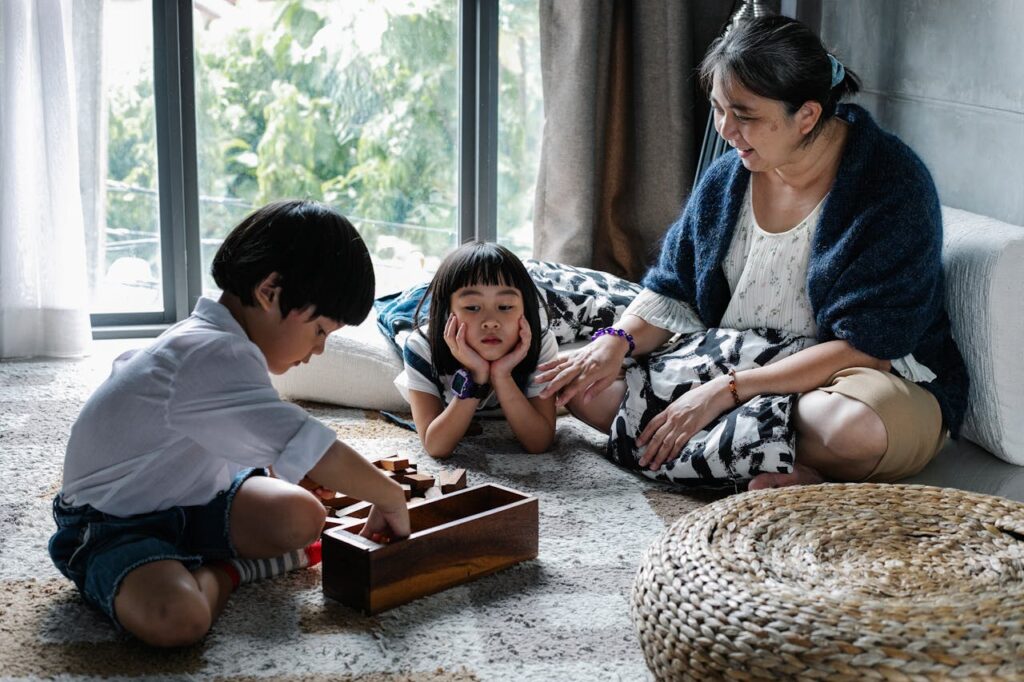Family relationships grow organically, and not always the way we intend. Parents do their best to provide a stable and loving environment. Children are wrapped up in the emotional ups and downs of growing up. Somewhere in between, it is possible for things to go awry. Resentment can grow even in loving households just from misunderstandings that accumulate over time.
You may notice signs your child resents you, but have no idea why or what to do about it. Rsentment does not mean you are a bad parent. It doesn’t mean you’ve neglected your child’s well-being. It’s a symptom of inattention that can be cured. From sulking toddlers to disrespectful teenagers to rocky relationships with your adult children, resentment is an elusive problem that gets worse the longer it goes unaddressed. As soon as you notice the signs your child resents you, however, you can start making ammends.
Understanding Resentment in Parent-Child Relationships
Resentment comes from misunderstandings. Dr Gene Beresin, a psychiatry professor of Harvard Medical School explains that “Resentment is a state of anger and unhappiness due to feelings of being treated unfairly.” Lack of structure, inconsistent rule-enforcement, and unexplained punishments are all common sources of resentment from a child to their parent. These problems often occur when you are tired, distracted, and don’t even notice the parenting mistakes being made until the red flags appear.
Past conflicts that go unaddressed can grow into estrangement, and resentment can begin even in young children if unaddressed — you don’t want to risk having an adult child with whom you have no contact. But with attention and care, resentment can be unraveled like a knot that has grown more tangled over time.
Why It’s Important To Recognize Resentment Early
Resentment often quietly builds up, going unnoticed until it manifests in more overt ways. Recognizing the subtle signs that your child resents you is important for maintaining a healthy, respectful relationship.
Resentment may be particularly obvious with girls, so you may find yourself wondering “Why does is my daughter so mean to me?” or “Why does my daughter hate me?” The answer lies in how you have built your child’s expectations over the past years. Bad patterns, subtle emotional abuse, and even treatment from family members can play a role.
Understanding the signs that your child doesn’t respect you or is always upset with you can prevent the escalation of feelings into deeper conflicts.

Credit: Pexels
The Role of Self-Determination Theory in Understanding Resentment
Self-Determination Theory (SDT) emphasizes the importance of autonomy, competence, and relatedness for human beings in relationships. Children need to be encouraged to become their best selves in an environment that they can rely on. When these needs are unmet, resentment can grow. Resentment often stems from disappointment and denied opportunities where a child would like to be self-determined, but can’t due to parental decisions outside their control.
This can lead to a disrespectful teenager and conflicts with a grown child who feels something was missing in their childhood.
The Impact of Childhood Resentment Toward Parents on Adult Children
Allowing childhood resentment to build up can have both short-term and long-term impacts. Resentment is not just bad for your child in the moment, it can lead to lifelong problems expecting disappointment and expressing distrust.
- Mental Health: Childhood resentment can lead to mental health issues like anxiety, depression, and low-self esteem in adulthood. Young adults who do not feel respected in childhood may fail to respect themselves. Mental illness can be linked to strong experiences of childhood resentment.
- Interpersonal Relationships: Past resentment can influence an adult’s ability to form and maintain healthy relationships. If they expect disappointment and see resentment as a relationship baseline, they may not be able to form healthy bonds with friends and romantic partners in their own life..
- Parenting Styles: Resentment can also act as a strong influencer on future child raising. Those who resented their parents and see them as self-centered will try to do the opposite when parenting their own children, and may discard the good with the bad from their own experiences.
- Personal Development: A child allowed to build resentment woard their parent may experience negative self-identity and confidence, making poor life choices stemming from unresolved childhood emotions. Emphasizing self-care for both parent and child can help address these issues and foster a healthier relationship.
Top 11 Signs Your Child Resents You
The good news is that parents have the power to dispel resentment once the problem has been identified. Communication, connection, and correcting the factors that generated the resentment in the first place can mend the divide. You can help children feel understood and cared for by listening to them and respecting their needs. But first, you must identify the signs your child resents you.
1. Avoidance of Spending Time Together
Children who feel resentment are often responding to disappointment. When your child avoids spending time with you, it can be a sign of underlying resentment because they don’t want to be disappointed again. While it may seem like your disrespectful teenager is just trying to blow you off, they may be protecting themselves instead.
This behavior is often a defense mechanism against feeling anger or frustration if that is what they expect from time spent together. Watch their body language, not just the defensive attitude that teenagers and angry children develop.
Solution:
Take the time to foster positive interactions by choosing activities your child enjoys and fulfilling promises on how your time will be spent. Don’t change or cancel plans, and spend time doing things your child wants to do. Go out for ice cream, watch their favorite movie, or play that video game together.
This approach helps meet their needs for relatedness and autonomy.
2. Frequent Arguments and Defiance
Frequent arguements and defiance may be seen as signs your child doesn’t respect you. In truth, they may be struggling with feelings of resentment and internal personal turmoil. Defiance in children and teens is often a stress reaction rather than trying to start a fight. While you’re wondering “Why is my daughter so mean to me?” your teenager is experiencing fear, anxiety, and a sense that they can’t trust you with their more vulnerable emotions.
This behavior often stems from unmet psychological needs
Solution:
Focus on active listening and acknowledging their feelings. This approach aligns with the principles of Self-Determination Theory by showing respect for their autonomy. It’s OK to find yourself walking on eggshells for a while, and being the first to say “I’m sorry”
Practical Step: Implement regular family meetings to discuss issues openly and collaboratively.
3. Negative Comments and Sarcasm
Among the signs that your child resents you, negative comments and sarcasm are often expressions of deeper resentment and frustration. These are verbal signs of discontent that can be seen as your child expressing a desire for connection, but an inability to be positive when sharing a conversation with you. Negative and sarcastic children, teenagers, and even adult children seek connection but their resentment is getting in the way of making that connection positive.
Solution:
Become the model for more respectful communication. With younger children, you can teach your child how to express their negative feelings in a more constructive way.
- “I’m not sure that’s true” instead of “Psh, yeah right!”
- “Let’s not go there” instead of “That’s none of your business!”
4. Withdrawal From Family Activities
Withdrawal from family activities can indicate that your child is struggling with feelings of resentment or disconnection. Kids who don’t feel safe or valued in the family dynamic may withdraw from family time instead of spending that time feeling ignored, resentful, or out of place. Long-term resentment can create that sense of disconnection.
Unfortunately, social media on phones makes it possible to fully withdraw from family time even while present in the room. Parents often lament how to deal with a disrespectful teenager without addressing the root cause of long-term resentful feelings.
Solution:
It’s important to create a welcoming environment for family time where everyone feels included. Make efforts to include your child in converstaions, decisions, and activities. Let them take a turn choosing what meals to prepare, what activities to do, and value their opinions when they are brave enough to share.
5. Increased Irritability and Mood Swings
Resentment can often cause rapid mood changes, especially in teenagers. This can be related to your child suddenly remembering that getting their hopes up can be futile. If your child is sunny and conversational one moment, then moody and angry the next, they may have experienced sudden resurgence of resentment. Certain facial expressions or sudden withdrawal from the conversation may be signs your child resents you and doesn’t know how to respond to that resentment.
Solution
Help your child develop coping skills and strategies for their emotions while mending the gap in trust that may be the root cause of resentment. Provide a stable, supportive environment your child can rely on, keep your promises and plans with your child, and be patient when their mood swings.
6. Expressing Anger Through Actions
Maybe your disrespectful teenager expresses their resentment through actions instead of words. Slamming doors, neglecting responsibilities, or acting in ways they know will upset you are all ways to express negative emotions without saying a word. These disruptions are often a subtle cry for help, a desire to be noticed, valued, and cared for without the ability to reach out and mend the resentment rift that has formed during their childhood.
Solution:
Wondering how to deal with a disrespectful teenager, you should address these behaviors with empathy and understanding. Recreate the structure that may have been less stable in their earlier life by establishing clear expectations and practical, not overly harsh, consequences for acting-out actions.
👉 Another sign of resentment from your child is when they become aggressive with you. Read this article, “Asking Yourself ‘Why Does My Toddler Hit Me’? Discover the 5 Main Causes & Solutions,” to understand the reasons and find effective solutions.
7. Avoidance of Personal Conversations
Some signs that your child resents you can include a refusal to talk about personal subjects. Some children deal with resentment by allowing the parent-child relationship to become superficial. Maybe they can joke over dinner and talk about school, but they won’t let you in when it comes to feelings, body image, or other more vulnerable subjects.
Avoiding personal conversations can indicate that your child feels uncomfortable or angry about unresolved issues.
Solution:
The best way to rekindle trust is to encourage open and honest conversation. Create a non-judgemental and supportive environment and earn back your child’s confidence that they can trust you to hear them out, comfort them when they are upset, and provide good advice on personal matters.
8. Complaining About Feeling Unheard or Invalidated
Listen when your child complains that you never listen to their feelings or consider how they feel. That sensation, for many children, is the root of resentment. However you think you are treating your child, understand that they feel unheard and invalidated.
They feel that their opinion doesn’t matter to you, that you don’t listen to their side of the story, and that you make decisions without considering them. Complaining is a good sign. They are still asking for you to care and even creating an opportunity to show that their feelings matter to you.
Solution:
Take the time to listen actively. Listen to your child all the way through and practice empathy to really understand how they feel. Consider your child’s concerns and think about them without immediately offering solutions. Ask your child what they want to do, guide them through solving their own problems, and express concern without making ultimatums. Greater connection will grow from there.
👉 Forget about past conflicts! Read this article, “How to Handle a Child Who Always Argues: Effective Strategies,” and find out how to improve your relationship with your child.

Credit: Pexels
9. Declining Academic or Personal Performance
A child who feels direspected and unvalued by their parent may stop valuing themselves. This sign your child resents you may be reflected in declining acaemic performance and a lack of trying in your child’s other activities. They may drop out of a club or quit a hobby. They may stop trying to make good grades or start getting in trouble at school.
A drop in academic or personal performance can be a sign of underlying emotional struggles, including resentment. They may feel that you don’t care, and their resentment spirals into a depression where they don’t care either.
Solution:
Provide support and resources to help your child succeed, both academically and personally. Show that you care. Ask about their grades. Ask to hear the song they’re learning in band or the monologue they’re practicing for theater. Show interest in their academic, creative, and personal development and express your desire for them to succeed.
10. Comparing You With Their Best Friend’s Parents
Lastly, children who compare their parent with friends’ parents can be one of the signs your child doesn’t respect you. This behavior often stems from feeling inadequate or failure to meet expectations compared to their friends and friends’ families.
Children might express envy or frustration when they perceive their friends’ parents as more understanding, lenient, or supportive.
Solution:
Ask your what specific qualities or actions they admire in their friends’ parents and discuss how you can incorporate some of these positive traits into your own parenting. Instead of taking this comparison as an insult, treat it as an opportunity to try things that your child is inspired by in other households.
11. Perceived Favoritism Toward a Sibling
When a child feels like you favor their sibling over them, it can lead to feelings of resentment. If you’re giving more attention, praise, or rewards to one child, the other might start feeling left out or unappreciated. This can cause arguments, withdrawal, or other signs of anger and frustration.
Solution:
Be fair and balanced in how you treat each child. Make an effort to spend one-on-one time with each of them and celebrate their individual achievements. Avoid comparing them to each other and focus on creating a positive environment where everyone feels valued.
This approach helps prevent feelings of favoritism and supports a happier, more harmonious family dynamic.

Credit: Pexels
Rebuilding Trust After Recognizing Resentment
Recognizing the signs of resentment is the first step toward healing. As a parent, you can rebuilt trust. However, building a trusting relationship requires effort, empathy, and understanding. You will need to commit yourself to setting a more positive standard of communication, consideration, and dedication to keeping promises between yourself and your child to mend the gap that resentment has created so far.
Moving Forward With a Positive Approach
Rebuilding the relationship with your child starts with a willingness to grow and adapt. Focus on the long-term health of your relationship and be patient if your initial overtures at peace are rocky. Your child needs time and reasons to trust you again, and you may need some emotional healing as well.
Commit to ongoing efforts to understand and meet your child’s emotional needs, using the principles of Self-Determination Theory as a guide for your actions.
Conclusion
Resentment is something that can grow by accident in a family. If you are noticing signs your child resents you, it’s not too late to mend the relationship by correcting the behaviors and misunderstandings that are at the root of the resentment. The key is to reopen communication, keep promises, and show your child that you really do care about them despite what they may have percieved in their childhood when you were busy, stressed, or not yet understanding their unique emotional needs.
If your child is showing signs of resentment, start the process of reaching out and rebuilding trust today.
References
American Association for Marriage and Family Therapy. (n.d.). Anger in the families. https://aamft.org/Consumer_Updates/Effect_of_Anger_on_Families.aspx
Brody, L., Copeland, A., Sutton, L., Richardson, D., Guyer, M. (1998). Mommy and Daddy like you best: perceived family favouritism in relation to affect, adjustment and family process. 269-291. https://doi.org/10.1111/1467-6427.00087
Maiorano, Michelle, “A case study on sibling rivalry and the use of a social skills training model” (2010). Theses and Dissertations. 125. https://rdw.rowan.edu/etd/125
Treisman, Joel H. (2019). Are All Happy Families Alike? Conceptualizing a Dashboard of Family Flourishing. Master of Applied Positive Psychology (MAPP) Capstone Projects. 225. https://repository.upenn.edu/mapp_capstone/225/









